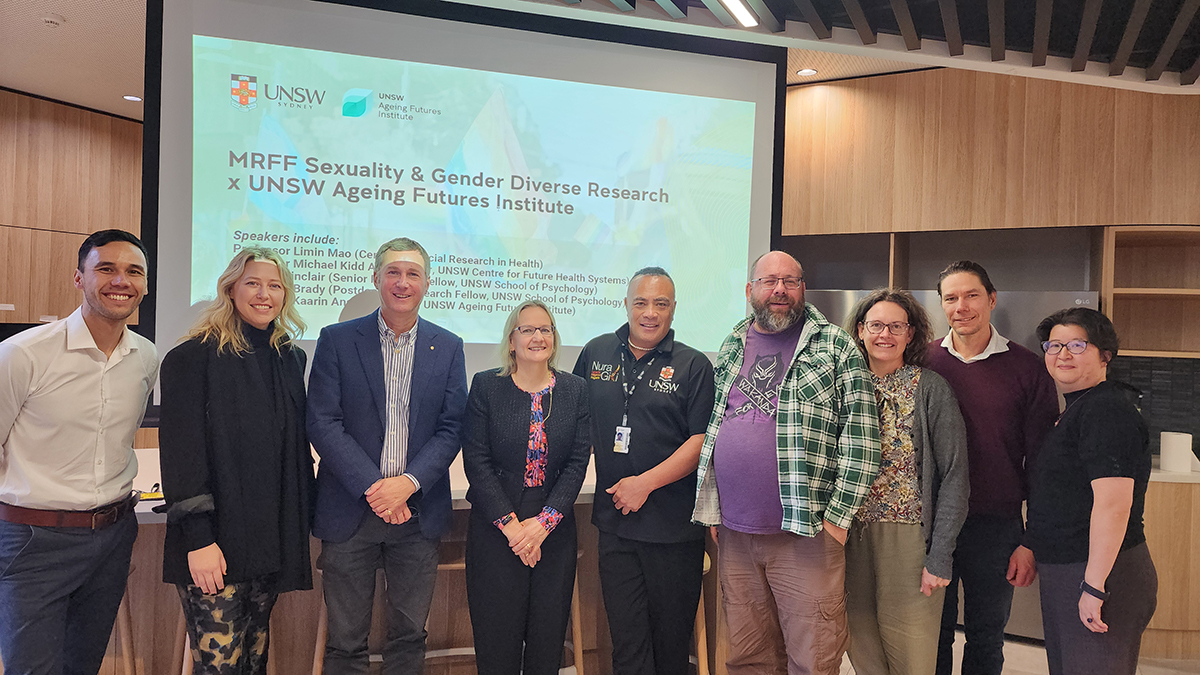
Three AFI-affiliated experts are contributing to projects creating models of care for older LGBTIQ+ people.
The Ageing Futures Institute (AFI) has celebrated the expansion of its work to include models of care for LGBTIQ+ communities at an event showcasing the Institute’s cross-faculty work.
The extension of the AFI’s work is supported by two recent Medical Research Future Fund (MRFF) grants for projects involving UNSW researchers from the faculties of Science, Health & Medicine, and Arts, Design & Architecture. The grants round, announced earlier in the year, focused on projects developing “Models of Care for Sexuality & Gender Diverse People & People with Innate Variations of Sex Characteristics”.
Professor Kaarin Anstey, Director, Ageing Futures Institute, congratulated the grant recipients.
“This much-needed consumer-led initiative will accelerate patient-centred care models,” she said.
Professor Michael Kidd, Director, Centre for Future Health Systems, Medicine & Health said everybody deserves to be treated with dignity and respect by our health care and aged care systems.
“We know that some older members of LGBTIQ+ communities continue to experience discrimination and may hide who they really are. Starting to receive aged care services at home, or going into an aged care facility, should never mean feeling the need to go back into the closet,” he said.
People living with dementia
Dr Brooke Brady, an ARC Postdoctoral Research Fellow in the School of Psychology, CEPAR and NeuRA, is working on one of the successful projects, led by Dr Louisa Smith from Deakin University. The project will focus on the refinement of a model of care for gender and/or sexuality diverse people living with dementia and the development, implementation and evaluation of LGBTIQ+ cultural competence training materials for health and aged care workforces.
“This funding round is the most significant investment into models of care that support the health and wellbeing of LGBTIQ+ communities in Australian history,” she said.
“We know that research exploring the needs of LGBTIQ+ communities has been sparse, and this is especially true for research that explores the needs of older LGBTIQ+ adults. By amplifying the voices of community members and collaborating across disciplines, universities, industry and community organisations, this work represents an important step forward in understanding what effective care looks like in the context of LGBTIQ+ ageing,” she said.
Inclusive residential care
Professor Limin Mao from the Centre for Social Research in Health, Arts, Design & Architecture is part of the team, led by Professor Mark Hughes from Southern Cross University, working on the second successful project. The project will engage LGBTIQ+ people and other stakeholders to co-design both a model for inclusive care within residential aged care facilities and guidelines and resources to support service providers in putting that model into practice.
She said the UNSW AFI researcher network is a supportive context for this work, particularly through its generous AFI seed funding scheme to support early-mid career researchers across faculties at UNSW.
“Although it is often not perceived as ‘sexy’, focusing on ageing, end-of-life and minority populations, it is our concerted passion to drive equity, diversity and inclusion in ageing-related research practice,” Prof. Mao said.
Dr Craig Sinclair from the School of Psychology is also working on the second project. He said that working collaboratively with LGBTIQ+ communities is a critical part of ensuring that ageing research meets the needs of those communities.
“These exciting new projects will develop education frameworks, implement training and trial innovative interventions aimed at improving the ageing and aged care experience for people from sexually and gender diverse communities,” he said.
Find out more about the UNSW Ageing Futures Institute.
Photo caption, left to right: Dr Dan Dumbrell, Dr Brooke Brady, Prof. Michael Kidd AO, Prof. Kaarin Anstey, Nikorima Thatcher, Andrew Heslop (Positive Life NSW), A/Prof. Catherine Macphail (UoW), Dr Craig Sinclair, Prof. Limin Mao
- Log in to post comments
